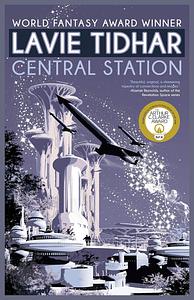Take a photo of a barcode or cover
Ahhhhh so good! Sort of combines the futuristic end-of-world urban culture clash of Bladerunner with the languorous, moody, impressionistic storytelling of a Wong-Kar Wai film. And there are vampires, and children who might be real and might be digital artifacts who have learned how to cross over into meatspace ("Universe-One.") I loved the pace, the world, the characters, the language, everything.
--
"You can ask me anything," the robot said, gently. Isobel wondered what dead human's voice had been used to synthesize the robot's own.
"Do robots feel love?" she said.
The robot's mouth moved. Perhaps it was meant as a smile. "We feel nothing but love," the robot said.
--
"You can ask me anything," the robot said, gently. Isobel wondered what dead human's voice had been used to synthesize the robot's own.
"Do robots feel love?" she said.
The robot's mouth moved. Perhaps it was meant as a smile. "We feel nothing but love," the robot said.
challenging
mysterious
reflective
slow-paced
Plot or Character Driven:
Character
Strong character development:
Yes
Loveable characters:
No
Diverse cast of characters:
Yes
Flaws of characters a main focus:
Complicated
It's more like 3.5 stars. This is beautifully written and interesting and maybe I should rate it higher, but I felt like it was almost too elliptical when coming to the conclusion of its various mysteries, and that's apparently not my preference in books with grand mysteries.
{Many thanks to NetGalley for sending me an eARC of Central Station in exchange for an honest review. For more reviews, check out Plan to Happy.}
Reading Central Station by Lavie Tidhar was a singular experience. This novel tells the story of the people of Central Station, a space port near the city of Tel Aviv.
Many of the chapters were originally published as individual short stories, making Central Station read like a hybrid between a single narrative and linked short stories. As a result of this structure, though, a few story lines felt unfinished. It also reads like a sci-fi classic, which is right up my alley.
The world of Central Station is so realistically drawn by Tidhar that his descriptions of fantastical aspects of the future seem like references to completely commonplace occurrences. Of course there's a robot priest, preaching to appliances, cyborgs, and robots in the Church of Robot. Of course people live their lives with a node embedded, connecting them to everyone else in the digital world.
Central Station contained so many quotable lines that I was tempted to flood my feed on Litsy (I'm Madeline there if you want to follow me!). I'll leave you with one of my favorites in an effort to entice you to read this novel, which explores themes of love, war, memory, and technology:
"There comes a time in a man's life when he realizes stories are lies. Things to not end neatly. The enforced narratives a human impinges on the chaotic mess that is life become empty labels, like the dried husks of corn such as are thrown down in the summer months from the adaptoplant dwellings, to litter the streets below."
Reading Central Station by Lavie Tidhar was a singular experience. This novel tells the story of the people of Central Station, a space port near the city of Tel Aviv.
Many of the chapters were originally published as individual short stories, making Central Station read like a hybrid between a single narrative and linked short stories. As a result of this structure, though, a few story lines felt unfinished. It also reads like a sci-fi classic, which is right up my alley.
The world of Central Station is so realistically drawn by Tidhar that his descriptions of fantastical aspects of the future seem like references to completely commonplace occurrences. Of course there's a robot priest, preaching to appliances, cyborgs, and robots in the Church of Robot. Of course people live their lives with a node embedded, connecting them to everyone else in the digital world.
Central Station contained so many quotable lines that I was tempted to flood my feed on Litsy (I'm Madeline there if you want to follow me!). I'll leave you with one of my favorites in an effort to entice you to read this novel, which explores themes of love, war, memory, and technology:
"There comes a time in a man's life when he realizes stories are lies. Things to not end neatly. The enforced narratives a human impinges on the chaotic mess that is life become empty labels, like the dried husks of corn such as are thrown down in the summer months from the adaptoplant dwellings, to litter the streets below."
A mosaic novel of Central Station, a major space port right next to Tel Aviv and set a couple of centuries into the future.
The story follows a group of loosely connected individuals through a science fictional stew of a setting. We have a robot priest, a cyborg family matriarch, a prodigal son returning with a martian parasite, AIs called Others, a data vampire, a cyborg super soldier falling in love and children who may be in the process of transcendence. That's all on the back of a settled solar system, incipient interstellar travel and an incredibly mature virtual fabric where things done in immersive MMO type worlds can be legitimate jobs.
There's not so much of a through plot here. It's all about the individual characters and their stories and how it all weaves a fabric. It's idea-rich, characterful, clever and uplifting. There's also a game for the reader in how many classic SF references you can find.
Lots of fun, brilliant ideas, but I think it would have needed more of a plot if it had gone longer.
The story follows a group of loosely connected individuals through a science fictional stew of a setting. We have a robot priest, a cyborg family matriarch, a prodigal son returning with a martian parasite, AIs called Others, a data vampire, a cyborg super soldier falling in love and children who may be in the process of transcendence. That's all on the back of a settled solar system, incipient interstellar travel and an incredibly mature virtual fabric where things done in immersive MMO type worlds can be legitimate jobs.
There's not so much of a through plot here. It's all about the individual characters and their stories and how it all weaves a fabric. It's idea-rich, characterful, clever and uplifting. There's also a game for the reader in how many classic SF references you can find.
Lots of fun, brilliant ideas, but I think it would have needed more of a plot if it had gone longer.
It would be five stars, but that wasn't a real ending. Gorgeous book.
emotional
reflective
medium-paced
Plot or Character Driven:
A mix
Strong character development:
Yes
Loveable characters:
Complicated
Diverse cast of characters:
Yes
Flaws of characters a main focus:
Yes
Moderate: Death, Drug abuse, Drug use, Blood, Death of parent
Originally posted on bluchickenninja.com.
My one and only problem with Central Station is that there didn’t seem to be a point to it. It didn’t have an overall story arc. It was more like a series of short stories set in the same world featuring the same characters. It got to the point around 75% of the way through where I still didn’t know what the end game was. The book didn’t feel like it was leading up to something. It was just a series of stories.
But even then each chapter didn’t feel like an individual short story. It was more like a little information about the character, maybe a little backstory and whatever else was going on. But I have to say the characters were interesting. You have one who is basically a Trill from Star Trek. You have a number of robots left begging for parts after the war they were built for ended. And you have what is basically a vampire. Who was infected with a virus which was created as a weapon for said war and makes them want to drink blood and take memories. I really liked the “vampires” in this book, I liked that there was a reason for them being there and it wasn’t just “oh yeah there are vampire in this version of the future”. I would have been happy if the whole book was just about the vampires.
I will say this, the world building was fantastic, it felt like a properly fleshed out world. It’s set in a futuristic Tel Aviv where at some point a spaceport was built allowing travel to Mars and further out into the solar system. The characters you met felt real, they felt like they belonged in the spaceport. But the actual story was boring. And the story is kind of important when it comes to books.
My one and only problem with Central Station is that there didn’t seem to be a point to it. It didn’t have an overall story arc. It was more like a series of short stories set in the same world featuring the same characters. It got to the point around 75% of the way through where I still didn’t know what the end game was. The book didn’t feel like it was leading up to something. It was just a series of stories.
But even then each chapter didn’t feel like an individual short story. It was more like a little information about the character, maybe a little backstory and whatever else was going on. But I have to say the characters were interesting. You have one who is basically a Trill from Star Trek. You have a number of robots left begging for parts after the war they were built for ended. And you have what is basically a vampire. Who was infected with a virus which was created as a weapon for said war and makes them want to drink blood and take memories. I really liked the “vampires” in this book, I liked that there was a reason for them being there and it wasn’t just “oh yeah there are vampire in this version of the future”. I would have been happy if the whole book was just about the vampires.
I will say this, the world building was fantastic, it felt like a properly fleshed out world. It’s set in a futuristic Tel Aviv where at some point a spaceport was built allowing travel to Mars and further out into the solar system. The characters you met felt real, they felt like they belonged in the spaceport. But the actual story was boring. And the story is kind of important when it comes to books.
Central Station had a gorgeous beginning, masterful worldbuilding, and some killer moments throughout. Yet, I felt like it needed some more structure to it. Scenes were too fast, and the book ended at the right time in the arc, but the middle felt lacking. There is a great elevator scene towards the end that showed the lightheartedness and insights slowing down can provide, and I hope Tidhar can use this tactic in perhaps more worlds from this well-developed book. The description and prose and tidbits and conlang were solid, and I think I would shelve it in my top ten SFF, but not without a lot of questioning.






